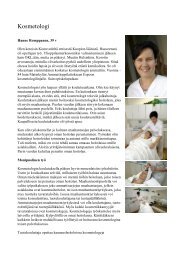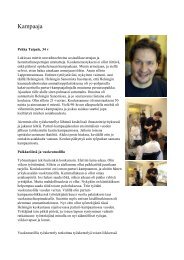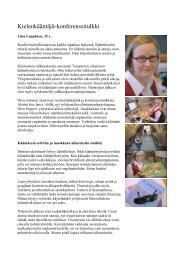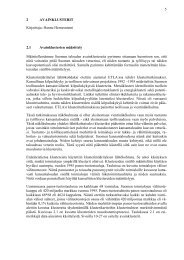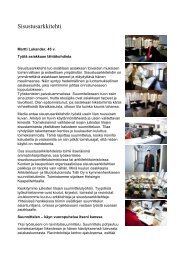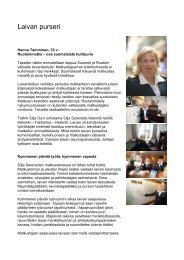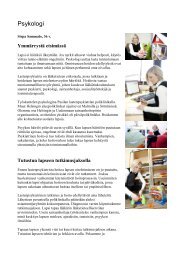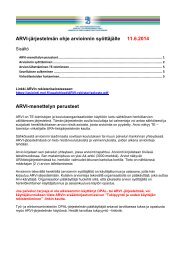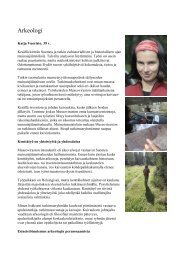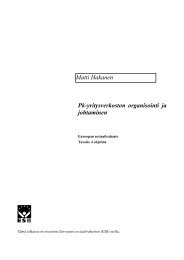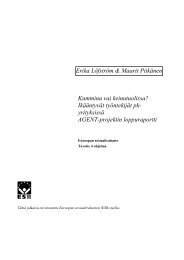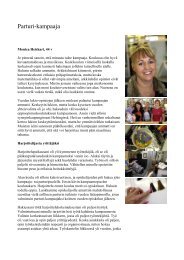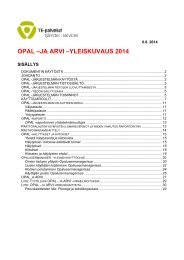Working Life Barometer in the Baltic Countries 2002 (pdf) - mol.fi
Working Life Barometer in the Baltic Countries 2002 (pdf) - mol.fi
Working Life Barometer in the Baltic Countries 2002 (pdf) - mol.fi
You also want an ePaper? Increase the reach of your titles
YUMPU automatically turns print PDFs into web optimized ePapers that Google loves.
257<br />
There have been no signi<strong>fi</strong>cant changes <strong>in</strong> <strong>the</strong> <strong>in</strong>cidence of secondary jobs.<br />
Altoge<strong>the</strong>r, 15 % of <strong>the</strong> wage earners do ano<strong>the</strong>r job <strong>in</strong> addition to <strong>the</strong>ir ma<strong>in</strong><br />
one. It is also possible to speak of <strong>the</strong> aforementioned normalisation trend <strong>in</strong><br />
<strong>the</strong> sense that <strong>the</strong> black economy would appear to have dim<strong>in</strong>ished considerably.<br />
On <strong>the</strong> basis of this study, less unreported <strong>in</strong>come is earned <strong>in</strong> Estonia<br />
than <strong>in</strong> Latvia and Lithuania. Delays <strong>in</strong> salary payment are also clearly less<br />
frequent <strong>in</strong> Estonia than <strong>in</strong> <strong>the</strong> o<strong>the</strong>r two <strong>Baltic</strong> countries. However, <strong>the</strong>y have<br />
not been completely elim<strong>in</strong>ated from Estonia, ei<strong>the</strong>r, because more than onetenth<br />
of <strong>the</strong> work<strong>in</strong>g people (12 %) stated that a delay <strong>in</strong> <strong>the</strong>ir salary payment<br />
had occurred dur<strong>in</strong>g <strong>the</strong> year preced<strong>in</strong>g <strong>the</strong> survey. In practice, however, long<br />
delays have ceased: <strong>the</strong> salaries have been only a few weeks late at <strong>the</strong> most.<br />
A normalisation trend can also be spoken of with regard to <strong>the</strong> number of<br />
hours worked. Almost half of <strong>the</strong> work<strong>in</strong>g people (47 %) had worked 40 hours<br />
<strong>in</strong> <strong>the</strong> week before <strong>the</strong> survey. This percentage is greater than <strong>in</strong> <strong>the</strong> previous<br />
survey. At <strong>the</strong> same time, <strong>the</strong> proportion who had worked a very long week<br />
(over 50 hours) had dim<strong>in</strong>ished. Also, relatively fewer were work<strong>in</strong>g less than<br />
40 hours a week. More work<strong>in</strong>g people than before came with<strong>in</strong> <strong>the</strong> sphere of<br />
normal work<strong>in</strong>g hours. This is connected with a decrease both <strong>in</strong> black <strong>in</strong>come<br />
and <strong>in</strong> overtime, as <strong>the</strong> study took account of all <strong>the</strong> hours worked by <strong>the</strong> respondents<br />
dur<strong>in</strong>g <strong>the</strong> previous week. Although less overtime had been done, it<br />
is important to note that only overtime paid <strong>in</strong> money had decreased. Overtime<br />
that was not compensated at all, or was compensated by days off, was just as<br />
common as earlier. In this regard, <strong>the</strong> trend is not unambiguously positive.<br />
The percentage of permanent employment relationships agreed on <strong>in</strong> writ<strong>in</strong>g<br />
has grown <strong>in</strong> relation to <strong>the</strong> total. There has been no change <strong>in</strong> <strong>the</strong> proportion<br />
of <strong>fi</strong>xed-term work<strong>in</strong>g relationships - it is still high (23 %), but lower than <strong>in</strong><br />
Latvia and Lithuania. The <strong>in</strong>creased proportion of permanent employment under<br />
written contract is due to <strong>the</strong> fact that illegitimate (orally agreed) work<strong>in</strong>g<br />
relationships are rarer nowadays than earlier. Extra written agreements between<br />
<strong>the</strong> employer and employee <strong>in</strong> addition to <strong>the</strong> work contract proper,<br />
which allude to some irregularity, also occur less frequently now. These extra<br />
agreements may stipulate fr<strong>in</strong>ge conditions that are ei<strong>the</strong>r negative or positive<br />
from <strong>the</strong> worker's po<strong>in</strong>t of view (for example, a ready-signed, undated notice<br />
of dismissal, black <strong>in</strong>come, etc.). In Estonia, <strong>in</strong> contrast to <strong>the</strong> o<strong>the</strong>r countries<br />
under comparison, agreements of this k<strong>in</strong>d have become rarer than before.




